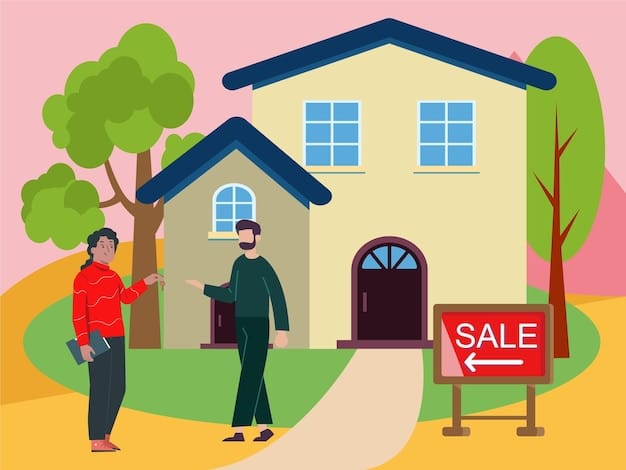Financial Planning for Homeownership: Strategies for 2025

Financial planning for homeownership in 2025 involves strategic saving, credit management, understanding mortgage options, and utilizing available resources to achieve sustainable and affordable homeownership.
Planning to buy a home in 2025? It’s an exciting goal, but it requires careful financial planning for homeownership: strategies for 2025 are key to making your dream a reality. Let’s dive into how you can prepare.
Understanding the 2025 Housing Market
Before diving into specific strategies, it’s essential to understand the landscape of the 2025 housing market. Factors such as interest rates, inflation, and economic growth play a significant role in determining affordability and investment potential.
Analyzing Current Trends
Keep an eye on expert forecasts regarding property values and interest rate movements. These insights can help you gauge the right time to enter the market.
Impact of Economic Factors
Understand how broader economic conditions like job growth and inflation may affect your ability to afford a home.

Planning effectively requires staying informed and adapting your approach to the evolving market. Here’s what to consider:
- Research local market conditions
- Monitor interest rate changes
- Assess your debt-to-income ratio
Successfully navigating the 2025 housing market begins with a solid awareness of the dynamic conditions influencing affordability and investment opportunities.
Creating a Realistic Budget for Homeownership
Building a realistic budget is a crucial step in preparing for homeownership. It involves not only calculating your potential mortgage payments but also accounting for all the associated costs.
Assessing Income and Expenses
Start by thoroughly evaluating your current income and monthly expenses. This provides a clear picture of how much you can realistically allocate to housing costs.
Calculating Affordability
Use online calculators and consult with financial advisors to determine the mortgage amount you can comfortably afford, considering factors like down payment, interest rates, and property taxes.
Creating a detailed budget can help avoid overextending yourself and ensure your long-term financial health as a homeowner. Key steps include:
- Tracking every expense
- Identifying areas to cut back
- Setting realistic savings goals
By creating a budget that reflects your financial situation, you’ll be better prepared to manage the costs associated with homeownership and avoid future financial strain.
Saving for a Down Payment
Saving for a down payment is a significant hurdle for many aspiring homeowners. The size of your down payment can impact your mortgage terms, interest rates, and overall affordability.
Setting Savings Goals
Determine the ideal down payment amount based on your target home price and mortgage options. Set specific, achievable savings goals to keep you on track.
Utilizing Savings Strategies
Explore various savings strategies, such as setting up automatic transfers to a dedicated savings account, reducing discretionary spending, and optimizing investment portfolios.

Saving enough for a down payment requires a disciplined approach and a commitment to your financial goals. Tips to help you save include:
- Automating your savings
- Cutting unnecessary expenses
- Exploring down payment assistance programs
Starting early and being consistent with your savings efforts can significantly increase your chances of reaching your down payment goal and securing your dream home.
Improving Your Credit Score
Your credit score plays a pivotal role in determining your eligibility for a mortgage and the interest rate you’ll receive. A higher credit score can translate into significant savings over the life of your loan.
Understanding Credit Scoring
Learn how credit scores are calculated and identify the factors that impact your score, such as payment history, credit utilization, and length of credit history.
Strategies for Improvement
Implement strategies to improve your credit score, such as paying bills on time, reducing credit card balances, and disputing any errors on your credit report.
Taking active steps to improve your credit score can have a lasting impact on your financial future as a homeowner. Key strategies include:
- Paying bills on time
- Keeping credit utilization low
- Avoiding opening too many new accounts
Improving your credit score is an investment in your future, helping you secure favorable mortgage terms and increase your financial flexibility.
Exploring Mortgage Options
Navigating the complex landscape of mortgage options is essential to finding the right loan for your individual needs and financial situation. Understanding different types of mortgages, interest rates, and terms can save you thousands of dollars over time.
Types of Mortgages
Research various types of mortgages, such as fixed-rate, adjustable-rate, FHA, and VA loans, to determine which one best aligns with your goals and risk tolerance.
Comparing Loan Terms and Rates
Shop around and compare loan terms, interest rates, fees, and other costs from multiple lenders to ensure you’re getting the most competitive offer.
Being informed about your mortgage options empowers you to make confident decisions that support your long-term financial stability. Consider these steps:
- Consult with mortgage brokers
- Get pre-approved for a loan
- Understand all associated fees
Carefully evaluating your mortgage options is a critical step in securing a home that fits your budget and financial goals.
Utilizing First-Time Homebuyer Programs
Many first-time homebuyer programs are available to assist individuals and families in achieving their homeownership dreams. These programs offer financial assistance, education, and other resources to make homeownership more accessible.
Federal and State Programs
Explore federal and state-sponsored programs that provide grants, low-interest loans, and tax credits to eligible first-time homebuyers.
Eligibility Requirements
Understand the eligibility requirements of each program, such as income limits, purchase price restrictions, and homebuyer education courses.
These programs can significantly reduce the financial burden of buying a home and provide valuable support throughout the process. Remember to:
- Research program eligibility
- Attend homebuyer workshops
- Apply early for assistance
Taking advantage of first-time homebuyer programs can make your journey to homeownership smoother and more affordable.
Long-Term Financial Planning Post-Purchase
The financial planning doesn’t stop once you’ve purchased your home. It’s important to maintain a long-term perspective and plan for ongoing expenses, maintenance, and potential financial challenges.
Building an Emergency Fund
Establish an emergency fund to cover unexpected home repairs, job loss, or other financial emergencies that may arise.
Planning for Maintenance and Repairs
Set aside funds each month to cover routine maintenance and repairs, preventing small issues from becoming costly problems.
Ongoing financial planning is essential to protect your investment and ensure you maintain financial stability as a homeowner. It’s important to:
- Review your budget regularly
- Plan for property taxes and insurance
- Consider long-term investments
By planning for the future, you can enjoy the benefits of homeownership without compromising your financial well-being.
| Key Point | Brief Description |
|---|---|
| 💰 Budgeting | Create a realistic budget accounting for all homeownership costs. |
| ✅ Credit Score | Improve your credit score for better mortgage rates. |
| 🏡 Down Payment | Save diligently for a sufficient down payment. |
| 🔎 Mortgage Options | Explore different mortgage types and terms. |
FAQ
▼
Generally, a credit score of 740 or higher is considered good and can help you secure better mortgage rates and terms.
▼
Ideally, saving at least 20% of the home’s purchase price is recommended, but there are options for lower down payments.
▼
Common programs include FHA loans, state-sponsored programs, and assistance from local housing authorities.
▼
Lowering your debt-to-income ratio involves reducing your debt and/or increasing your income to improve affordability.
▼
Consider property taxes, insurance, maintenance, repairs, and potential homeowner association fees.
Conclusion
By implementing these financial planning strategies for homeownership in 2025, you can confidently pave the way to owning your dream home. Staying informed, disciplined, and proactive in your financial preparations will ensure a successful and sustainable homeownership journey.





